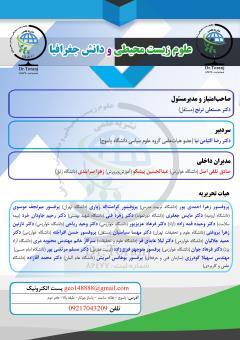تبیین الگوی شهر هوشمند با تأکید بر حکمروایی شهری
محورهای موضوعی : Geography
1 - دانشگاه آزاد اسلامی یاسوج
کلید واژه: شهر هوشمند, طرحهای ساختاری – راهبردی, حکمروایی شهری , توسعه شهری,
چکیده مقاله :
شهرها به طور ذاتی با چالشهای پیچیده و گسترده ای که به هم مرتبط (اند مواجه هستند که تنها از طریق یک رویکرد سیستماتیک قابل حل است. به عبارت دیگر تجمع انبوه عظیمی از ساکنان منجر به آشفتگی و بی نظمی شده و شرایطی را بوجود آورده که نه تنها تعادل شهرها را به سقوط کشانده بلکه دستیابی به پایداری را با روشهای کنونی اداره و توسعه شهری ناممکن ساخته است در نتیجه برنامه ریزان شهری در سراسر جهان می کوشند تا با نگاهی یکپارچه به تمامی ابعاد شهرنشینی مدلهایی را برای توسعه شهرهای قرن ۲۱ به منظور پاسخگویی به خواسته ها و انتظارات جدید دنیای امروز توسعه دهند یکی از مفاهیم جدید جهت مقابله با چالش های کنونی شهرها در عرصه برنامه ریزی شهری توسعه شهر هوشمند میباشد که در طول سالهای اخیر توجه زیادی را به خود جلب کرده است شهر هوشمند به عنوان محور تحول و توسعه هزاره مطرح شده و به معنای گشایش مفاهیمی نو در برنامه ریزی شهری است که قابلیتهای جهان واقعی و مجازی را برای حل مشکلات شهری با هم ترکیب می کند.
Cities inherently face complex and wide-ranging challenges that can only be solved through a systematic approach. Not only has the balance of cities collapsed, but it has also made it impossible to achieve sustainability with the current methods of urban management and development. As a result, urban planners around the world are trying to develop models for the development of 21st century cities with an integrated view of all dimensions of urbanization. Responding to the new demands and expectations of today's world, one of the new concepts to deal with the current challenges of cities in the field of urban planning is the development of a smart city, which has attracted a lot of attention in recent years, the smart city as the axis of transformation. And the development of the millennium has been proposed and means the opening of new concepts in urban planning that combines the capabilities of the real and virtual worlds to solve urban problems.
• جدی، علیاصغر (۱۳۸۶). الزامات معمارانه در پدافند غیر عامل پایدار، تهران: انتشارات دانشگاه شهید بهشتی.
• محمد زاده یزد، فرشته (1392)؛ شهر هوشمند: مطالعه موردی شهروندان و کارگزاران شهر مشهد، پایاننامه کارشناسی ارشد دانشگاه تهران
• ملک مکان، سمیه (1393) بازشناسی ویژگیهای شهر هوشمند ارائه سازوکارهای دستیابی به آن.پایاننامه مدیریت امور شهری،دانشگاه تهران.
• حاتمی نژاد، حسین و دیگران (1394)؛ سیاستهای فضایی در برنامهریزی شهری، انتشارات پاپلی.
• Colin, Harrison; Ian Abbott, Donnelly, (2011). A THEORY OF SMART CITIES, Proceedings of the 55th Annual Meeting of the ISSS - 2011, Hull, UK, Proceedings of the 55th Annual Meeting of the ISSS
• Luis M. Correia IST/IT, Klaus Wünstel (2011) “smart cities application and requirements” White Paper 2011-05-20.
• UN, United Nations. (2008). World Urbanization Prospects: The 2007 Revision Population
Database. Retrieved from http://esa.un.org/unup.
• Schaffers, H. Komninos, N. Pallot, M. Trousse, B. Nilsson, M. Oliveira, A (2011). Smart Cities and the Future Internet: Towards Cooperation Frameworks for Open Innovation. Future Internet Assembly, LNCS 6656, pp. 431–446.
• Abdulrahman, A., Meshal, A., Imad, F. T. A. (2012). Smart Cities: Survey”, Journal of Advanced Computer Science and Technology Research
• Bolívar, M. P. R., & Meijer, A. J. (2016). Smart Governance: Using a Literature Review and
Empirical Analysis to Build a Research Model. Social Science Computer Review, 34(6), 673-692.
• Chourabi, H. Taewoo, N. Shawn, W. J. Ramon,G.G. SehlMellouli, K. N. Theresa, A. P. & Hans J. S. (2012). Understanding smart Cities: An integrative framework. 2012 45th Hawaii International Conference on System Sciences: 2289- 2297.
• Cohen, B. (2012). The top 10 smart cities on the planet, CoExist, 17 January. Available online at: http://www.fastcoexist.com/1679127/the-top- 10-smart-cities-on-the-planet [Accessed 17 April 2013].
• Meijer (2013) Governing the Smart City: Scaling-Up the Search for Socio-Techno Synergy. Permanent Study group on E-Government, Utrecht University.
• Walravens, N. (2012). Mobile Business and the Smart City: Developing a Business Model
• Winters, J.V. (2011). Why are Smart Cities Growing? Who Moves and Who Stays. Journal of Regional Science. 51 (2). 253–270 .
• Shapiro, J. M. (2006). Smart cities: quality of life, productivity, and the growth effects of human capital. The review of economics and statistics, 88(2), 324-335 .
• Schuurman D, Baccarne B, De Marez L and Mechant P (2012) Smart ideas for smart cities: Investigating crowdsourcing for generating and selecting ideas for ICT innovation in a city context. Journal of Theoretical and Applied Electronic Commerce Research 7(3): 49–62.


